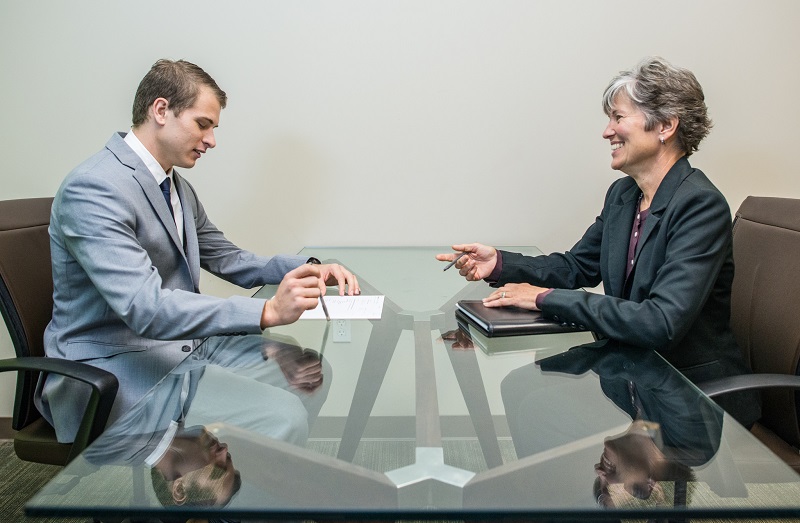In the immortal words of Ella Fitzgerald: ‘It ain’t what you do, it’s the way that you do it’.
That sentiment rings particularly true when you’re selling yourself in an interview. It’s the way in which you present your personal story and experience that will ultimately convince someone to hire you over someone else.
Employers these days want to know whether you’ll fit into the workplace culture, if you’re a team player, if you’re agile and how you cope under pressure. Illustrating your experience in the correct way will tell them all they need to know.
So how do you convince them that you’re the one they need? How do you position yourself as not just capable, but an expert?
Here’s everything you need to know before you step into the interview room for your next role.
1. Don’t think of a solution: be the solution
Before you even begin to think of yourself as the answer to your target company’s problem, you need to understand the problem they’re experiencing. If there’s a position to be filled, it’s because the organisation needs something they don’t already have.
Do they need a shorter sales pipeline? More up-to-date IT infrastructure? Agile, proactive management? Establish what the specifics of the role are and how the company as a whole will benefit from it being filled. Once you understand the role, you can start to determine how your experience fits the bill.
2. Show don’t tell
Nobody wants to hear about your great interpersonal skills, the fact that you’re a strong leader or how you work well in a team. These types of responses are clichéd, lazy and near-meaningless.
If you want to highlight your skills, focus on a specific example that demonstrates your effectiveness. What were the challenges? How did you overcome them? Did you enjoy the experience? What did you learn from it? What did you learn about yourself? Remember: show, don’t tell.
3. Connect the dots
Think about the interview process as a painting. When you’re painting, you need to layer colours and brushstrokes until you have a finished piece.

Once you’ve found specific, relevant examples of your experience, think about how these examples demonstrate your skills and competencies. Did the experience highlight your decision-making skills? Did it prove your powers of diplomacy? Did it show forward-thinking?
Keeping everything connected and fluid helps to build your story for the interviewer.
4. Shine like a STAR
A significant proportion of any interview is likely to be focussed on competency. In asking each candidate the same questions, the interviewer is supposed to achieve an objective view of all their candidates. So how do you make sure you stay cool, calm and that your answer proves you possess the necessary qualities?
The STAR acronym technique provides one reliable method. By breaking your answer down into four sections, you ensure what you’re saying is confident, concise and includes all the key details.
For example, if an interviewer asked you to tell them about a tight deadline you’ve met, you could give your answer as follows:
- Situation – present the context and setting for the story. For example: “There was an upcoming presentation for a prospective big client, rescheduled from two weeks’ notice to 36 hours.”
- Task- what was required of you, and what tasks were you given? “As Chief Marketing Officer, it was my job to build a strategy to show the prospect how we could help to grow their business.”
- Activity – what did you do? “After a quick meeting with the CEO, I called a marketing team meeting to ensure everyone knew what they needed to do. We stayed at the office until 11pm working on the strategy and finishing the presentation.”
- Result – what happened? “The presentation went well and we ended up winning the client. The short and intense time frame worked to our advantage, making us pull together as a team.”
A few elements will enhance your answers to the STAR framework.
As with any story, detail is crucial. Where possible, use people’s names, and mention timeframes and places to make yours more engaging. And keep it positive. Even if the outcome wasn’t what you expected or you didn’t meet a deadline or goal, put a positive spin on the story by focussing on what you learned from the experience. Finally, remember brevity. Yours may be the twentieth interview of the day and long, rambling stories make it more likely the listener will switch off, so keep your responses clear and concise.
5. Body Language
Beyond skills and competencies, there are always factors and questions which lie outside the white edges of your CV. Non-verbal communication is an important one.
What’s your body language saying in the interview? We tend to focus so much on verbal communication that we forget how visual human beings are. How you come across can have a huge impact on the interviewer’s opinion of you. Remember to sit up straight, keep an open posture, maintain eye contact when answering questions and… smile!
6. Think outside the box
What else could your interviewer be interested in? They might ask how your previous role impacted positively on the company as a whole, not just your department. Or they may be interested in projects you’ve started and completed. This could include examples outside of work, as long as they demonstrate relevant initiative and motivation. How have you collaborated with other departments and teams? What is your attitude to lifelong learning? Where do you see yourself in ten years’ time?
Spending time considering the finer details of what an employer is looking for will give you the edge over other candidates. Even if they don’t end up asking you any of these questions, it will help you feel more confident and well-prepared on the day.
Of course, interviewing isn’t easy. There’s natural anxiety that comes with being scrutinised, self-doubt about your abilities and the pressure that comes with having your heart set on a dream job. While no amount of preparation will eliminate nerves, taking a methodical approach to how you present your experience can help you feel calmer and more confident – and ultimately more likely to get the result you want.
